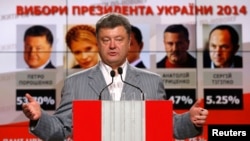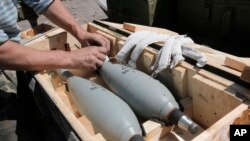WASHINGTON —
Petro Poroshenko, a billionaire businessman and politician, is scheduled to be sworn in as Ukraine’s president next week.
Experts say he will be tested immediately and will face daunting challenges.
The main one is how to end the violence in the eastern regions of Donetsk and Luhansk, scene of fighting between armed separatists and the Ukrainian military. Poroshenko says his first visit as president will be to Donetsk.
Former U.S. Ambassador Steven Pifer said Poroshenko “has an opportunity to go there and reach out and basically persuade people that he is going to listen to their concerns. And he is going to be cognizant that he is not going to be the president of only just western and central Ukraine, but he wants to be the president of all of Ukraine.”
Anders Aslund, with the Peterson Institute for International Economics, has known him for a decade.
“He gets along with everybody. He’s quite charismatic," Aslund said. "He is a very good executive. You can say that he’s center-right or a centrist. He has very few enemies. He’s a deal-maker and he has been a successful businessman by developing food processing, mainly chocolates in Ukraine.”
Poroshenko owns Ukraine’s biggest confectionary company, Roshen, as well as Channel Five - one of the most popular television stations in Ukraine and an affiliate of Voice of America.
He has other economic interests, including shipyards. His wealth is estimated at $1.3 billion, making him the seventh richest man in Ukraine.
Poroshenko also has had government experience, serving as foreign minister and trade minister. He was also a strong backer of the “Orange Revolution” that brought Viktor Yushchenko and Yulia Tymoshenko to power in 2004.
And he played a leading role in the protests in Kyiv’s central square that toppled President Viktor Yanukovich in February.
Poroshenko is generally considered to be an oligarch.
But Steven Pifer, U.S. ambassador to Ukraine in the Clinton administration, said he is not an oligarch in the strict sense of the term.
“A lot of oligarchs got their start back in the early 1990s by taking advantage of the difference between the official prices and world prices. If you could buy a commodity - oil, or gas or something at an official price in Ukraine in the early 1990s, and somehow sell it at world prices, you could make a huge profit,” Pifer said.
“And I think Poroshenko actually made his money by hard work and just creative ideas and good business sense. He pursued a less normal route to becoming an oligarch,” he said.
Poroshenko was elected president of Ukraine with a decisive 55 percent of the vote - above the simple majority needed to avoid a run-off.
Besides dealing with separatists in the East, Poroshenko will need to balance his policy of forging closer ties with the European Union while improving relations with Russia, at a time when Moscow is trying to destabilize Ukraine.
Poroshenko said he will sign the association agreement with the European Union later this month - an accord that would, among other things, create a free trade zone between the EU and Ukraine.
Pifer said the main question is how Russian President Vladimir Putin will react if Poroshenko goes ahead with the signing.
“The major Russian pressure on the Ukrainian acting government in February came after it was clear that the acting government’s intent, after it took office, after Yanukovich fled, was to pursue the European Union option and to sign the association agreement,” Pifer said.
“And once that was clear, you had the seizure of Crimea, you had the barring of certain Ukrainian exports to Russia, you had the raising of gas prices, you had support for armed separatists in eastern Ukraine,” he said.
Pifer said for Russian President Vladimir Putin, the association agreement begins to move Ukraine outside Moscow’s sphere of interest - something he does not want to happen.
And he added that the world will have to wait and see what Putin will do - if anything - to prevent the signing.
Experts say he will be tested immediately and will face daunting challenges.
The main one is how to end the violence in the eastern regions of Donetsk and Luhansk, scene of fighting between armed separatists and the Ukrainian military. Poroshenko says his first visit as president will be to Donetsk.
Former U.S. Ambassador Steven Pifer said Poroshenko “has an opportunity to go there and reach out and basically persuade people that he is going to listen to their concerns. And he is going to be cognizant that he is not going to be the president of only just western and central Ukraine, but he wants to be the president of all of Ukraine.”
Anders Aslund, with the Peterson Institute for International Economics, has known him for a decade.
“He gets along with everybody. He’s quite charismatic," Aslund said. "He is a very good executive. You can say that he’s center-right or a centrist. He has very few enemies. He’s a deal-maker and he has been a successful businessman by developing food processing, mainly chocolates in Ukraine.”
Poroshenko owns Ukraine’s biggest confectionary company, Roshen, as well as Channel Five - one of the most popular television stations in Ukraine and an affiliate of Voice of America.
He has other economic interests, including shipyards. His wealth is estimated at $1.3 billion, making him the seventh richest man in Ukraine.
Poroshenko also has had government experience, serving as foreign minister and trade minister. He was also a strong backer of the “Orange Revolution” that brought Viktor Yushchenko and Yulia Tymoshenko to power in 2004.
And he played a leading role in the protests in Kyiv’s central square that toppled President Viktor Yanukovich in February.
Poroshenko is generally considered to be an oligarch.
But Steven Pifer, U.S. ambassador to Ukraine in the Clinton administration, said he is not an oligarch in the strict sense of the term.
“A lot of oligarchs got their start back in the early 1990s by taking advantage of the difference between the official prices and world prices. If you could buy a commodity - oil, or gas or something at an official price in Ukraine in the early 1990s, and somehow sell it at world prices, you could make a huge profit,” Pifer said.
“And I think Poroshenko actually made his money by hard work and just creative ideas and good business sense. He pursued a less normal route to becoming an oligarch,” he said.
Poroshenko was elected president of Ukraine with a decisive 55 percent of the vote - above the simple majority needed to avoid a run-off.
Besides dealing with separatists in the East, Poroshenko will need to balance his policy of forging closer ties with the European Union while improving relations with Russia, at a time when Moscow is trying to destabilize Ukraine.
Poroshenko said he will sign the association agreement with the European Union later this month - an accord that would, among other things, create a free trade zone between the EU and Ukraine.
Pifer said the main question is how Russian President Vladimir Putin will react if Poroshenko goes ahead with the signing.
“The major Russian pressure on the Ukrainian acting government in February came after it was clear that the acting government’s intent, after it took office, after Yanukovich fled, was to pursue the European Union option and to sign the association agreement,” Pifer said.
“And once that was clear, you had the seizure of Crimea, you had the barring of certain Ukrainian exports to Russia, you had the raising of gas prices, you had support for armed separatists in eastern Ukraine,” he said.
Pifer said for Russian President Vladimir Putin, the association agreement begins to move Ukraine outside Moscow’s sphere of interest - something he does not want to happen.
And he added that the world will have to wait and see what Putin will do - if anything - to prevent the signing.










